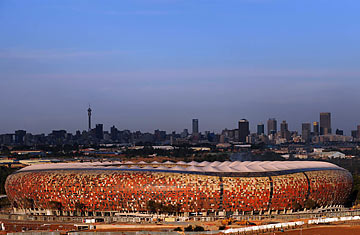
The Soccer City Stadium in Johannesburg will host both the opening and final matches of the FIFA 2010 World Cup
This year's World Cup in South Africa could be one of the greatest ever advertisements for the continent — or a disaster. There are many potential stumbling blocks: infrastructure, transport, security. Some of these may turn out to be unexpected triumphs: the stadiums, for instance, are nearly finished — and they look fantastic. But for fans and players alike, the biggest doubts over the soccer tournament, which begins in June, center on security. South Africa has some of the highest levels of violent crime in the world, and protecting half a million foreigners, many of whom will be men with a taste for beer, would be nigh-on impossible anywhere, let alone in a country where the police can be inept and corrupt. Add in a world press that's only too ready to confirm the unimaginative (and mistaken) view that Africa only produces bad news and all it will take for, say, the British press to label the World Cup a catastrophe is for a couple of drunken England fans to stumble into the wrong part of town.
Still, South Africa's success or failure shouldn't be written off five months before the first ball is kicked. But that's exactly what has happened following the Jan. 8 attack on a bus carrying the Togolese national team in the northern Angolan province of Cabinda, where an Angolan rebel group killed three people — the bus driver, a coach and the team's press officer — and injured at least two players on their way to an Africa Cup of Nations match. Even though the attack took place in a country other than South Africa, Britain's Daily Mirror declared the incident a "disaster for the forthcoming first-ever World Cup in Africa. The machine-gun attack on the Togo players may have taken place in northern Angola last night, but the shots would have been heard around the world." Fox News said "the fatal attack on the Togo national team in Angola has increased concerns that the 2010 FIFA World Cup in South Africa will be targeted by terrorists as violence continues to rage on the troubled continent." The London Daily Telegraph told its readers that "Africa's dream is in tatters." "It is hard to measure the damage that has been done," it intoned.
This is nonsense. Africa is not a country. The distance between Paris and Kosovo is about half that between Cape Town and Cabinda, yet no one thought the war in the Balkans made the 1998 World Cup in France unsafe. South Africa has security problems, yes, but rebel groups are not one of them. As an exasperated Danny Jordaan, South Africa's chief tournament organizer, said, "We urge the world not to play double standards. When a terrorist incident happens in any European country, no other European country is linked to it."
Let's be clear: Angola's decision to hold an international football match in Cabinda was an extremely poor one. Cabinda is an oil-rich province where the Front for the Liberation of the Enclave of Cabinda (Flec) is fighting for independence and a fair share of oil revenues. But you can hardly blame that decision on South Africa or extrapolate that the Jan. 8 attack portends disaster for the World Cup. What about the fact that South Africa is years ahead of Angola in terms of industrialization, organization and experience in running sporting events? What about the fact that South Africa recently held a successful warm-up tournament for the World Cup, the FIFA Confederations Cup? What about the fact that, like France and the former Yugoslavia, the two countries have little to do with each other?
There is just one sense in which the Angolan attack is a pre–World Cup warning: it heightens concerns that the event will be targeted by bad journalists as ignorance continues to rage in the troubled profession.
